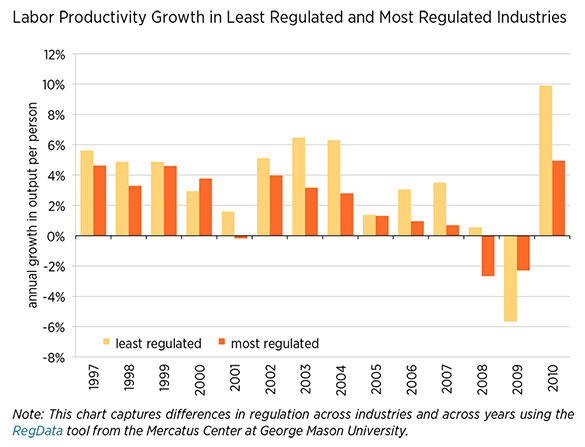Analysis of the data suggests that industries that are more regulated are also less productive. The one-third of industries that are least regulated show growth rates in output per hour and growth rates in output per worker that are 1.8 and 1.9 times, respectively, the growth rates for the one-third of industries that are most regulated.
While federal regulators often have good intentions—such as improving worker safety or protecting the environment—agencies frequently do an inadequate job measuring the adverse impact their proposed regulations could have on the economy.
This is particularly troubling in light of a new study published by the Mercatus Center at George Mason University, which finds that more rules can lower economic productivity in the regulated industry. Author Antony Davies quantifies the economic impact of federal regulations using data from the Bureau of Labor Statistics and regulatory information from the Mercatus Center’s RegData, a tool that uses text analysis to quantify the federal regulations targeting each industry in the United States. According to the data, less regulated industries outperform more heavily regulated industries in a variety of production efficiency measures. Therefore, policymakers should consider leaving markets to be regulated more by consumers through purchasing choices, particularly with market solutions and improved technology narrowing the information gaps between consumers and producers.
To read the complete study and learn more about its author, see “Regulation and Productivity.”
KEY POINTS
Less Regulated Industries Perform Better
The study analyzes the productivity of various industries between 1997 and 2010.
- More lightly regulated industries outperformed more heavily regulated industries in 12 out of 14 years on output per person, and in 10 out of 14 years on output per hour.
- From 1997 to 2010, the least regulated industries experienced 63 percent growth in output per person (see the chart below), 64 percent growth in output per hour, and a 4 percent decline in unit labor costs.
- In contrast, during the same period, the most regulated industries experienced only 33 percent growth in output per person, 34 percent growth in output per hour, and a 20 percent increase in unit labor costs.
- Regulations can have an immediate impact on economic performance. When controlling for differences in efficiencies, economic conditions, and investment costs, the data show that an increase in rules corresponds with a significant decline in efficiency the following year.
Agencies Should Let Consumers Regulate the Market
Some argue that government regulations can be beneficial when correcting for information asymmetries: the classic example is a used-car purchaser who lacks knowledge of the car’s maintenance history. But market players have recognized the value of providing consumers with more information.
- Consumer Reports, CARFAX, Underwriters Laboratories, and eBay’s seller rating system are some of the methods available to consumers to help them make more informed choices.
- Regulation by consumers is voluntary, and individuals can choose which firms to reward or punish based on whether those businesses meet their needs.
- By contrast, government regulation encourages rent-seeking, as businesses and individuals pursue the adoption of rules that benefit them.
CONCLUSION
Empirical analysis suggests that more regulated industries are less productive. To the extent that government regulation decreases productivity, consumers end up paying higher prices and society expends more scarce resources than it would otherwise to meet consumer demand. Increased regulation also encourages rent-seeking by larger, more established firms lobbying agencies to establish rules that hinder future competition.


